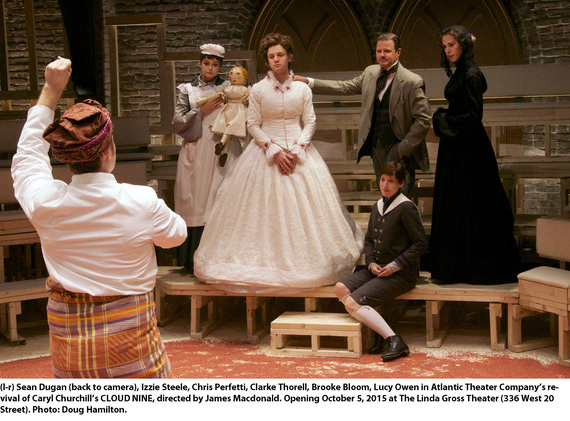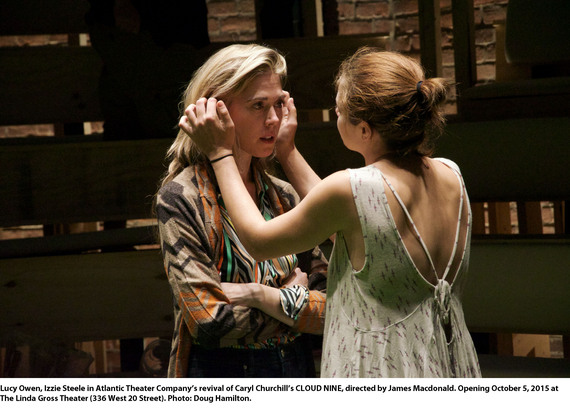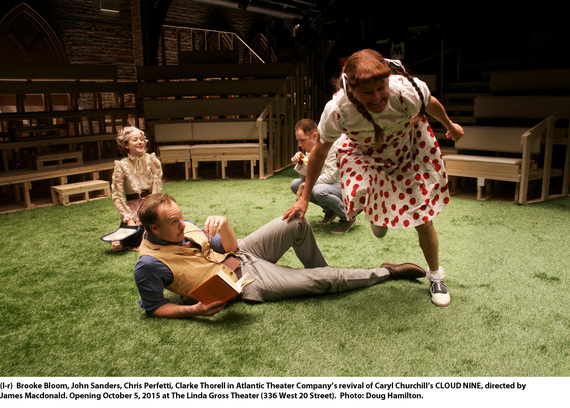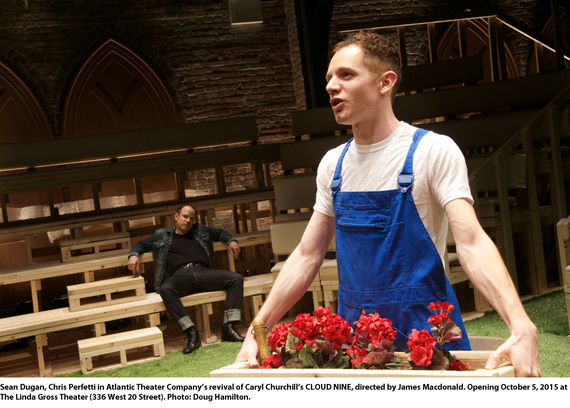As you approach the Linda Gross Theater, you're struck by the imposing quiet of it. Sealed doors keep out the faint of heart; the Church-like building sleeps, bathed in the light of an October moon. Could this be your destination, or have you made a mistake? Surely, you must be up an avenue -- such silent architecture can't harbor the violent turmoil of drama, the storm before catharsis.
You walk inside, nervous, afraid you might disturb ceremony or tradition. You find clumps of theatergoers in unusually subdued chatter. Up a few steps lies a floor covered in deep crimson dirt. Eyes on all sides innocently devour your presence as you inadvertently step onto the earthy ground, feeling the crunch underneath your flats. An usher shows you to your seat, which like the Coliseum surrounds that curious scene below, with its redness and its simulation of another time and place. You crave to feel its crunch under your feet again, to remember the touch of feigned nature, but you'll have to wait until intermission.
Such is the ambiance for Cloud Nine, performed by the Atlantic Theater Company. In her 1979 play, Caryl Churchill juxtaposes Victorian Africa under British reign with 1970s London. Churchill has always proved ahead of her time. Even four decades ago, she grappled with themes of gender and sexuality that were just burgeoning, on the cusp of illumination. Her feminist outlook focuses on the female role within a patriarchy, and in the 20th century, her ideas must have been scandalously revolutionary.
However, today, in a moment when celebrities like Miley Cyrus advocate for blurred identity definitions, Churchill's hypotheses feel less polemical and more thought provoking. Indeed, at its center, Cloud Nine comments on loneliness, and how you so desperately want to physically connect with others so you sense your humanity and feel less alone in a world filled with threats and tragedies. The politics of the piece are important, but the fact that Churchill refuses to moralize her plot allows the viewer to interface with it on a personal level. It does not estrange, does not create an "us and them" dynamic when exploring misogyny and bigotry. Instead, it encourages you to relate. It teaches you what you are because of the pseudo-emotional link to others that you crave: a person.
Atlantic Theater Company's version is superbly acted. Director James Macdonald understands Churchill's voice and pulls it out of his cast. The story follows one family -- with odds and ends added in -- and is a tale of how you interact with your loved ones whom you might not always like. Lucy Owen's sensitivity and deadpan delivery make her an ideal Maud/Victoria as she plays grandmother and granddaughter. Sean Dugan adopts all of the prideful, aristocratic airs that Joshua represents, but he can also transition into bad boy Gerry -- with his slime and disgust -- on a moment's notice. Izzie Steele moves seamlessly between independent, sexually promiscuous widow to second-wave feminist lesbian. From young boy to elderly woman, Brooke Bloom delivers a poignant final monologue about jettisoning the lectures her mother preached and accepting her libido and thus her existence without a male attaché.
John Sanders goes from charismatic adventurer to the boring white male "feminist" you meet in college, who claims it's a statement of gender equality to be in an open relationship, who supports you in your career until it means any sacrifice on his part, who suggests your ideologies are why he can't help you orgasm. Chris Perfetti is better as Edward than Betty, more comfortable in the modern era than in colonial cross-dress, where he proves unwontedly one-dimensional. And Clarke Thorell has all the panache of a good Englishman in the first act, while he could improve his childlike impression in the second.
Nearly all of the actors portray the reverse personality of their original characters from the first half in the second, and they do so with extraordinary care. They still seem to be congealing as a cast, but their chemistry and potential are undeniable.
My only qualms lie in logistics. For one, the jump from the 19th century to the late-20th feels abrupt, especially because some of the characters appear in both acts, though played by different actors, and they have only aged by 25 years. This anachronism seems unnecessary -- there was plenty to discuss during the fin de siècle, or in the 1970s. If Churchill wanted to show a change over time, she could have done so within the boundaries of chronology, so that the continuation of the narrative eased naturally, without a disjointed thump. Some of the more complex comparisons between eras get lost in translation, as the audience uses all of its concentration trying to resituate itself in the action.
Also, there is no need for so much lustfulness (a shocking revelation, I know). While Churchill seems intent on communicating the urgency of mortal connection -- to insinuate the need for visceral attachment even in an environment driven by individualism and ambition -- this analysis does not require statutory rape, incest, etc. Those subplots are interesting, and the play certainly makes you question your immediate gag reflex to them. But perhaps more of the characters could be guided by intentions other than infatuation, or by something beyond carnal sentiment. This diversity would permit a differentiation between amorous and platonic involvement, so that Churchill's oeuvre could apply to a broader spectrum of relationships.
Still, Cloud Nine is valiant and meaningful, even decades after it was conceived. Though it contains humor, it is not a spectacle (there are plenty of those, valid in their own right, but that make for another kind of evening). No, the mentally exhausting play requires intensive contemplation and an acceptance of confusion, ambiguity, and perplexity. You're not left with a conclusion, a bit of wisdom to glean and take away into the Chelsea air. In its place, Churchill provides you with hours of material that will frustrate, challenge, beguile, and intrigue -- like an amuse-bouche that sends you into a larger universe of taste.
What I'm saying is "go." Go on a night when you are very awake, when you need to philosophize. When you want a distraction, but not an easy one. Go not for lights and glamour, not for the sparkle of it all. Go alone or with a brooding partner, not with the person you can share superficial dialogue with but nothing more. Go for gelato at Amorino afterwards, and be ready to talk about more than the shallow gossip of everyday life.
Go prepared. But go.
Cloud Nine runs at the Linda Gross Theater through November 1.



